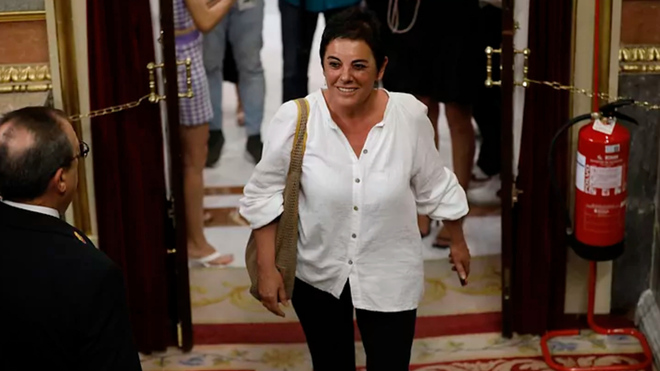The Democratic Memory Law that condemns the Francoist regime as illegal, annuls its political sentences, recognizes the victims of the Civil War and the dictatorship, commits the State to the search and exhumation of thousands of people buried in ditches and mass graves, has obtained the green light from Congress with the support of the two government parties – PSOE and United We Can – which have been joined by Bildu, PNV and various minority formations. The law, in addition, by imposition of the abertzale group accepted by the PSOE, extends the suspicion of Francoism and violation of human rights until December 31, 1983, five years after the approval of the Constitution including the first year of Government of Felipe Gonzalez.
It has been precisely the additional provision of Bildu, incorporated in exchange for their votes, which has tarnished, in the eyes of the opposition, a legal text originally intended to unite but which in the end has ended up dividing and whose days could be numbered if in the next general elections the Government changes sign. The PP has already announced its intention to repeal it from the first minute if it manages to reach Moncloa.
The bill, which will now go to the Senate and could be definitively approved in September, has not had the support of ERC, BNG, JxCAT and the CUP. The first two forces have opted for abstention and the second two for the vote against. For all of them, the key to their position lies in the fact that the law does not repeal the Amnesty Law of 1977, which they call the law of impunity or full stop. The 13 deputies of ERC have left the Hemicycle when the representative of Vox has taken the floor.
The debate prior to the vote on the text has been a harsh exchange of accusations and reproaches, an example of irreconcilable differences, to the point that the Minister of the Presidency, Félix Bolaños, went up to the rostrum after the representatives of the political groups to point out “what the law says and not what some say the law says.” In his intervention, the minister highlighted the best aspects of the law and recalled that to recognize the victims of terrorism there is already another law approved practically unanimously. To this he added that the one that now obtains the approval of Congress will not serve for any terrorist to enter the category of victim.
His words have not convinced the main opposition forces for whom the law is “miserable” and “disgusting”, an “infamy” and “perversity” because it has been agreed with the “heirs of ETA” excluding, they affirm, of democratic memory, the hundreds of victims of terrorism, torpedoes the harmony of the Transition and even “insults Felipe González”.
The intervention of the representative of Bildu, Bel Pozueta, has come to add salt to the wound of the division. The deputy confirmed that the objective of her amendments is none other than to investigate and do justice with respect to Francoism “in its widest extension”, that is, extending the scope of the law until the end of 1983.
He also emphasized that for its formation, the 1978 Constitution “did not open a period of peace and democracy for all and did not end the violation of rights.” In addition, he was in charge of highlighting the transfer of the Palacio de la Cumbre to the San Sebastián City Council to turn it into a monument of memory, a building he said, “where the young Basques José Antonio Lasa and José Ignacio Zabala were tortured.”
For the opposition, however, it is a sectarian and biased law that “uses the memory of the dead for the benefit of the political interests of the living,” in the words of Cs deputy Guillermo Díaz. A law that, from now on, according to the PP, will be remembered as the “Bildu law” or “totalitarian memory law”, a “frontal attack on the Transition”. The popular have summoned the PSOE to explain if among the monuments dedicated to memory they will include, in addition to the Palacio de la Cumbre, the dungeon in which José Antonio Ortega Lara was kidnapped for more than 500 days.
Conforms to The Trust Project criteria
















